Stogie News: Cuba Wins Latest Battle Over Cohiba Name
10 Dec 2008
As we reported Friday, a legal ruling in the decade-long battle over the Cohiba brand name could be a major setback for the General Cigar Co. General, a subsidiary of Swedish Match AB and one of the largest premium cigar makers in the world, makes and distributes such famous brands in the U.S. as Macanudo, Partagas, Punch, Hoyo de Monterrey, Bolivar, La Gloria Cubana, and many others.
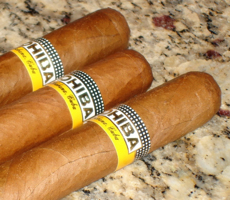 But the General brand at the heart of the controversy is Cohiba, perhaps the most famous trademark in cigars. Last month Cubatabacco, the storied Cuban tobacco monopoly (also known as Habanos SA), won a major victory in the latest decision in the protracted legal fight with General over the Cohba name. The key decision changed the standard that determines who has the rights to the Cohiba trademark—rendering a 2004 ruling against General Cigar Co. upheld.
But the General brand at the heart of the controversy is Cohiba, perhaps the most famous trademark in cigars. Last month Cubatabacco, the storied Cuban tobacco monopoly (also known as Habanos SA), won a major victory in the latest decision in the protracted legal fight with General over the Cohba name. The key decision changed the standard that determines who has the rights to the Cohiba trademark—rendering a 2004 ruling against General Cigar Co. upheld.
The decision rests on a legal standard known as the “famous marks doctrine,” which states that a trademark is protected in a given nation if it is well-known, even though the mark is neither used nor registered there. The court found that despite the fact Cubatobacco didn’t file for a trademark on the Cohiba name, under the famous names doctrine it still retains the name’s rights.
The case is complicated by the fact that the Cuban trade embargo means that Cubatobacco can’t sell Cohibas in the U.S. Notwithstanding that well-known fact, the judge held that consumers were likely to be confused between Dominican-made and Cuban Cohiba cigars.
Judge Notes Cubatobacco’s ‘Cozy’ Relationship with Cigar Aficionado
The 2004 decision also provides a unique look into the premium cigar business. The first 70 pages of the decision read like a history of the Cohiba name and of cigar marketing practices, including fascinating details of the role played by Cigar Aficionado in establishing the Cuban Cohiba’s mystique.
At one point, in a discussion over how well-known the Cuban Cohiba was in the early nineties, the judge observes a “cozy relationship between…Cubatabaco’s marketing department and the editorial staff of Cigar Aficionado” that resulted in multiple “puff pieces,” or positive publicity for Cohiba.
The Future of General Cigar’s Cohiba Line is Uncertain
If the current ruling stands, the decision will mark the end of General Cigar’s “Red Dot” Cohiba lines. As part of the 2004 ruling, the judge ruled that General must turn over all its cigars and other materials that contain the Cohiba name. However, that order seems to be pending any appeal by General Cigar.
In a statement provided to StogieGuys.com, General Cigar’s Dan Carr, the senior vice president of sales and marketing, said “we strongly disagree with the Judge’s ruling and will continue to vigorously defend our position, up to and including (if necessary) taking an appeal of his ruling.”
We asked General Cigar what the ruling means for the immediate future of the Dominican Cohiba line, and if the company would continue to market and produce the cigar. We are told, however, that aside from the above statement, “given that this is pending litigation, we cannot comment further.”
photo credit: Wikipedia

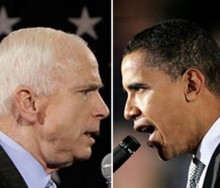 But being a former smoker (or even a current one) doesn’t make a politician good when it comes to taking positions that affect cigar smokers. Below are four areas where the next president could have a major impact on stogie enthusiasts with a look at the positions held by McCain and Obama in each area.
But being a former smoker (or even a current one) doesn’t make a politician good when it comes to taking positions that affect cigar smokers. Below are four areas where the next president could have a major impact on stogie enthusiasts with a look at the positions held by McCain and Obama in each area.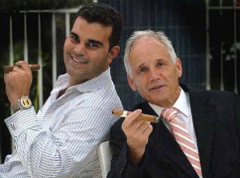 Camacho Cigars’ portfolio of ten brands includes Camacho, Baccarat ”The Game,” La Fontana, Legend-Ario, National Brand, Repeater, Deluxe, Don Macho, Don Felo, and Nude Bundles. We have extensively reviewed Camacho’s cigars, including the
Camacho Cigars’ portfolio of ten brands includes Camacho, Baccarat ”The Game,” La Fontana, Legend-Ario, National Brand, Repeater, Deluxe, Don Macho, Don Felo, and Nude Bundles. We have extensively reviewed Camacho’s cigars, including the 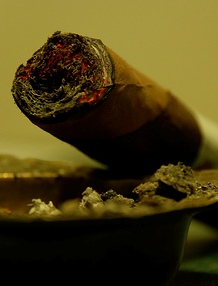 But understanding what’s happening in the increasingly hostile smoking ban movement is an essential tool in asserting our freedoms as cigar smokers and standing up for the rights of restaurant and bar entrepreneurs across the nation. In that spirit, and since I haven’t written anything similar since
But understanding what’s happening in the increasingly hostile smoking ban movement is an essential tool in asserting our freedoms as cigar smokers and standing up for the rights of restaurant and bar entrepreneurs across the nation. In that spirit, and since I haven’t written anything similar since 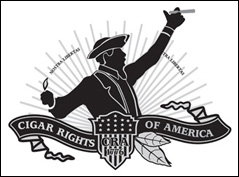 In late May we first got word of the formation of Cigar Rights of America (CRA), a new organization whose stated goals are “to fight unjustified tax increases and halt smoking bans.” The organization’s logo (which looks like a silhouette of George Washington holding a cigar) and rhetoric hearken back to America’s founding principles of life, liberty, and the pursuit of happiness. The website announces:
In late May we first got word of the formation of Cigar Rights of America (CRA), a new organization whose stated goals are “to fight unjustified tax increases and halt smoking bans.” The organization’s logo (which looks like a silhouette of George Washington holding a cigar) and rhetoric hearken back to America’s founding principles of life, liberty, and the pursuit of happiness. The website announces:
 Patrick Ashby
Co-Founder & Editor in Chief
Patrick Ashby
Co-Founder & Editor in Chief Patrick Semmens
Co-Founder & Publisher
Patrick Semmens
Co-Founder & Publisher George Edmonson
Tampa Bureau Chief
George Edmonson
Tampa Bureau Chief